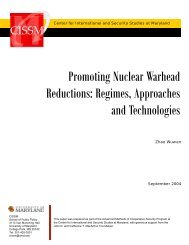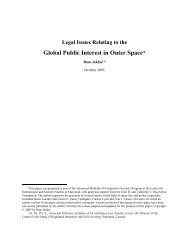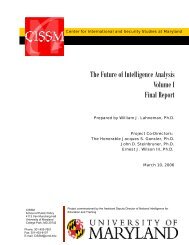A Reassurance-Based Approach to Space Security - Center for ...
A Reassurance-Based Approach to Space Security - Center for ...
A Reassurance-Based Approach to Space Security - Center for ...
- No tags were found...
You also want an ePaper? Increase the reach of your titles
YUMPU automatically turns print PDFs into web optimized ePapers that Google loves.
ecommend continuing <strong>to</strong> conduct war games and crisis simulations involving U.S. andChinese offensive counterspace warfare, developing temporary and reversible means <strong>to</strong>negate others’ space capabilities, and perpetuating U.S. superiority both in military spacecapabilities and in terrestrial capabilities <strong>to</strong> fight even without reliance on space assets.While deterrence may have been the most viable organizing principle <strong>for</strong> Cold Warsecurity, given the intense ideological rivalry between the superpowers and the extraordinarydestructive power of nuclear weapons, neither is a basic feature of current space securitypolicy. Today, the main space-faring states have far more common interests than they haveconflicting ones. Each has the means <strong>to</strong> interfere with others’ use of space, but fewinterference scenarios would benefit a state more than it would harm it. The fact thatmultiple states could use a military or space capability designed <strong>for</strong> another purpose as anASAT if their own satellites were attacked probably has a residual deterrent effect, but this isnot the main reason states have consistently refrained from attacking each other’s satellites.If states were <strong>to</strong> make such deterrence relationships the dominant principle guiding militaryand diplomatic ef<strong>for</strong>ts <strong>to</strong> enhance space security, they would promote and institutionalize anunnecessarily adversarial and military-dominated approach <strong>to</strong> space security.From a strategic standpoint, the fundamental problem of security in space hasremained constant—i.e., how <strong>to</strong> provide enough reassurance that others <strong>to</strong>lerate and maybeeven facilitate your space activities. The context <strong>for</strong> this question, though, has shifted fromone where two roughly equal adversaries were locked in a deterrence relationship <strong>to</strong> a muchmore asymmetrical and highly interdependent world. Long after the end of the Cold War,the United States maintains military superiority in space and on Earth, but its greaterdependence on space means that there is also relatively greater U.S. vulnerability <strong>to</strong>deliberate or inadvertent interference. As in<strong>for</strong>mation technology becomes more central <strong>to</strong>the global economy, many countries see it as strategically important <strong>to</strong> have their own basicspace capabilities <strong>for</strong> development, economic growth, political influence, and militarymodernization. Yet, the global spread of space capabilities also distributes the rudimentarymeans <strong>to</strong> interfere with others’ space assets. 38 Because it is technically and economicallyimpractical <strong>to</strong> protect unilaterally all the governmental and commercial satellites on which itdepends, the United States needs reliable reassurance that other countries will neither usetheir space-related capabilities <strong>to</strong> attack its satellites nor engage in irresponsible spacebehavior that puts these satellites at risk. The rest of the space-faring world also seeksreliable reassurance that the United States will be a “responsible” space power: that it willabide by the same rules as everybody else does, that it will respect other countries’ rights <strong>to</strong>use space freely in the same ways it does, and that it will not exploit space <strong>for</strong> unfair militaryor commercial advantages. Furthermore, they want reassurance that they can have a place atthe table when key decisions affecting their use of space are made.Such a reassurance-based, cooperative security regime <strong>for</strong> space would differ fromtraditional arms controls in several important respects. Contrary <strong>to</strong> traditional arms controls,which sought <strong>to</strong> stabilize deterrence by minimizing an adversary’s incentives <strong>to</strong> initiate orescalate a nuclear war and maximizing incentives <strong>for</strong> restraint, a reassurance-based spacesecurity regime would try <strong>to</strong> maximize everybody’s ability <strong>to</strong> use space <strong>for</strong> peaceful purposeswhile minimizing deliberate or inadvertent interference.38 Joan Johnson-Freese, <strong>Space</strong> as a Strategic Asset (NY: Columbia University Press, 2007), pp. 9-10.25







